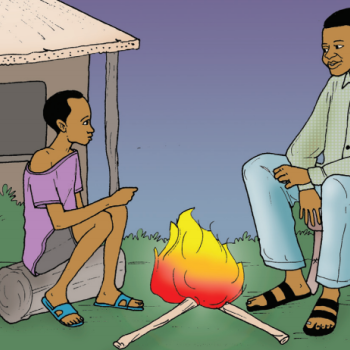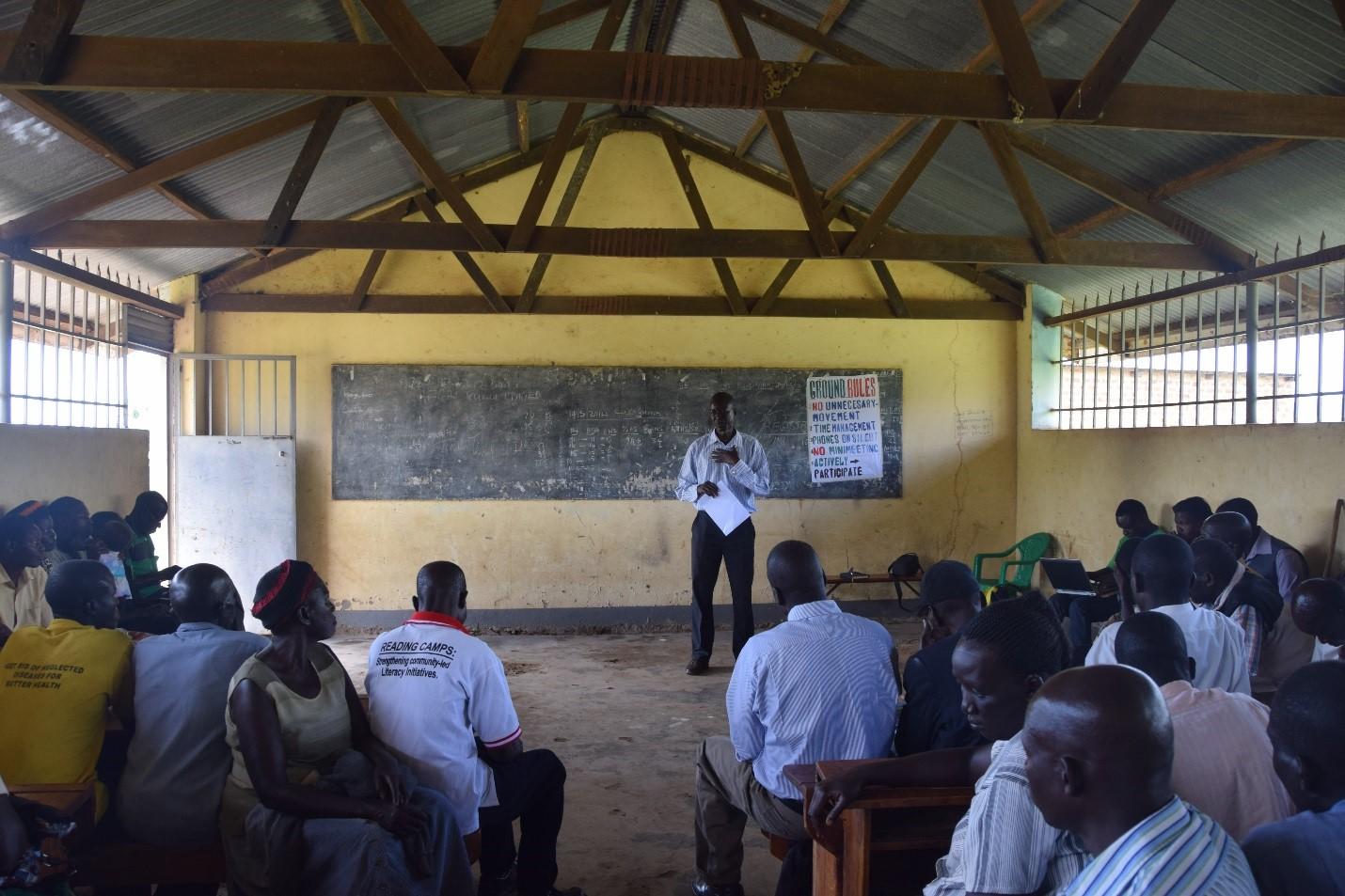
In northern Uganda, after more than 20 years of civil strife, people face considerable sexual and reproductive Gender Roles, Equality and Transformations (GREAT) project sought to challenge spousal violence, inequitable household workloads, poor menstrual hygiene management and more with the hopes of fostering more equitable gender attitudes and behaviours.
Under GREAT, Save the Children, together with the Institute for Reproductive He
Why the Community Action Cycle?
This community mobilization process engaged and empowered over 300 leaders—such as elected councilors, clergy, and teachers—to drive the change they want to see, as well as create sustainable impact by traveling around their communities to discuss issues related to gender equality. Talking in formal settings (like schools or civic organizations) or informal settings, (such as markets or after church) brought dialogues on the importance of gender equality for all; in these settings, Ugandans were able to own and control the conversations and, ultimately, the change. By the end of the two-year implementation period, (2012-2016), these Community Action Cycle 'change agents' made contact with over 80,000 people.

During a recent qualitative evaluation I conducted of the successes and challenges of the GREAT project, respondents told me that the Community Action Cycle helped transform their community in two important ways:
-
The Community Action Cycle brought together many people from different levels of society, such as the young and the elderly, and sub-country government with parish government. This produced a more harmonious decision-making process and action. In an interview, a local elected leader talked about how sending a cadre of change agents into the community, and then facilitating a process of reporting back, allowed him to better understand the important issues in his society and to be a better advocate for the needs of youth in the community. The Community Action Cycle was able to reach previously unheard voices and facilitate cross-society cooperation to tackle pressing issues. As one extension worker from Lira District told us:
“When the change agents came in, many people said they wanted to see school dropouts reduced, so girls would be performing equally like boys. The community urged these change agents to sit down and write a bylaw at the parish level as one way forward to address this issue, which stated that each parent within the community should ensure that his or her pupil goes to school. It was a combination of the CAGs, going to the local counselors, within the village in that parish. After its passage, the schools reported that the number of school dropouts was reduced, both girls and boys.”
- The Community Action Cycle helped communities restore traditions lost to war. Prior to the Lord’s Resistance Army’s (LRA) incursion into northern Uganda, families and neighbors periodically gathered around a large community fire at night, called “wang-oo,” in the Acholi language. These fires provided opportunities for intergenerational discussion, for education, and community gathering. However, during the time of the LRA’s occupation, it was not safe to be outside at night. While the LRA’s exit in the late 2000s meant that over one million people could finally return from refugee camps to their homes, important pieces of life from before the war—like the wang-oo—have been slower to come back. The GREAT team, however, identified wang-oo as a potential structure to build on to foster/catalyze intergenerational discussions on gender equality and healthy adolescent development. Respondents we talked to underlined the importance of the Community Action Cycle in not only reinforcing positive messages about gender equality, but also restoring cultural traditions like the wang-oo.
One parent from Lira District told us:
“The greatest significant change that I feel Community Action Groups achieved in the community is that the intervention reconstructed and reinstated the eroded cultural practice of wang-oo, which has now provided a platform that parents use to gather youth and sensitize their children on life skills and sex education.”
Why it counts
The Community Action Cycle succeeded in facilitating cooperation across sectors of society, making linkages that led to sustainable and structural community change, like changes to bylaws to protect girls from early marriage and support their education. It also opened up opportunities for local elected leaders to better understand their communities. GREAT’s Community Action Cycle allowed us to build capacity to hear from many, many more voices, including those of youth. In addition, the Community Action Cycle helped restore traditions of unity and intergenerational sharing that facilitated discussions between adults and children about healthy sexual and reproductive choices, puberty, the importance of education in a girls’ life, and not relying on violence to resolve disputes.
- Learn more about the findings from the Community Action Cycle qualitative evaluation.
- Check out the How-To Guide to learn how to adapt and integrate GREAT into your own work.
- Explore the GREAT Scalable Toolkit and the Community Action Cycle Implementation Guide.
Chris Hook is a Senior Program Coordinator at Save the Children USA. Reach him at chook@savechildren.org
#YLgenderyouth
Panelists Nana Dagadu and Rebecka Lundgren of IRH and Brad Kerner of Save the Children will discuss GrowUp Smart, GREAT, and the importance of programs for VYAs in The Metrics of Growing Up: Developmentally-appropriate Approaches for Intervention and Measurement at the Young Lives Conference on Adolescence, Youth and Gender from 8-9 September, 2016.

In northern Uganda, after more than 20 years of civil strife, people face considerable sexual and reproductive Gender Roles, Equality and Transformations (GREAT) project sought to challenge spousal violence, inequitable household workloads, poor menstrual hygiene management and more with the hopes of fostering more equitable gender attitudes and behaviours.
Under GREAT, Save the Children, together with the Institute for Reproductive He
Why the Community Action Cycle?
This community mobilization process engaged and empowered over 300 leaders—such as elected councilors, clergy, and teachers—to drive the change they want to see, as well as create sustainable impact by traveling around their communities to discuss issues related to gender equality. Talking in formal settings (like schools or civic organizations) or informal settings, (such as markets or after church) brought dialogues on the importance of gender equality for all; in these settings, Ugandans were able to own and control the conversations and, ultimately, the change. By the end of the two-year implementation period, (2012-2016), these Community Action Cycle 'change agents' made contact with over 80,000 people.

During a recent qualitative evaluation I conducted of the successes and challenges of the GREAT project, respondents told me that the Community Action Cycle helped transform their community in two important ways:
-
The Community Action Cycle brought together many people from different levels of society, such as the young and the elderly, and sub-country government with parish government. This produced a more harmonious decision-making process and action. In an interview, a local elected leader talked about how sending a cadre of change agents into the community, and then facilitating a process of reporting back, allowed him to better understand the important issues in his society and to be a better advocate for the needs of youth in the community. The Community Action Cycle was able to reach previously unheard voices and facilitate cross-society cooperation to tackle pressing issues. As one extension worker from Lira District told us:
“When the change agents came in, many people said they wanted to see school dropouts reduced, so girls would be performing equally like boys. The community urged these change agents to sit down and write a bylaw at the parish level as one way forward to address this issue, which stated that each parent within the community should ensure that his or her pupil goes to school. It was a combination of the CAGs, going to the local counselors, within the village in that parish. After its passage, the schools reported that the number of school dropouts was reduced, both girls and boys.”
- The Community Action Cycle helped communities restore traditions lost to war. Prior to the Lord’s Resistance Army’s (LRA) incursion into northern Uganda, families and neighbors periodically gathered around a large community fire at night, called “wang-oo,” in the Acholi language. These fires provided opportunities for intergenerational discussion, for education, and community gathering. However, during the time of the LRA’s occupation, it was not safe to be outside at night. While the LRA’s exit in the late 2000s meant that over one million people could finally return from refugee camps to their homes, important pieces of life from before the war—like the wang-oo—have been slower to come back. The GREAT team, however, identified wang-oo as a potential structure to build on to foster/catalyze intergenerational discussions on gender equality and healthy adolescent development. Respondents we talked to underlined the importance of the Community Action Cycle in not only reinforcing positive messages about gender equality, but also restoring cultural traditions like the wang-oo.
One parent from Lira District told us:
“The greatest significant change that I feel Community Action Groups achieved in the community is that the intervention reconstructed and reinstated the eroded cultural practice of wang-oo, which has now provided a platform that parents use to gather youth and sensitize their children on life skills and sex education.”
Why it counts
The Community Action Cycle succeeded in facilitating cooperation across sectors of society, making linkages that led to sustainable and structural community change, like changes to bylaws to protect girls from early marriage and support their education. It also opened up opportunities for local elected leaders to better understand their communities. GREAT’s Community Action Cycle allowed us to build capacity to hear from many, many more voices, including those of youth. In addition, the Community Action Cycle helped restore traditions of unity and intergenerational sharing that facilitated discussions between adults and children about healthy sexual and reproductive choices, puberty, the importance of education in a girls’ life, and not relying on violence to resolve disputes.
- Learn more about the findings from the Community Action Cycle qualitative evaluation.
- Check out the How-To Guide to learn how to adapt and integrate GREAT into your own work.
- Explore the GREAT Scalable Toolkit and the Community Action Cycle Implementation Guide.
Chris Hook is a Senior Program Coordinator at Save the Children USA. Reach him at chook@savechildren.org
#YLgenderyouth
Panelists Nana Dagadu and Rebecka Lundgren of IRH and Brad Kerner of Save the Children will discuss GrowUp Smart, GREAT, and the importance of programs for VYAs in The Metrics of Growing Up: Developmentally-appropriate Approaches for Intervention and Measurement at the Young Lives Conference on Adolescence, Youth and Gender from 8-9 September, 2016.

